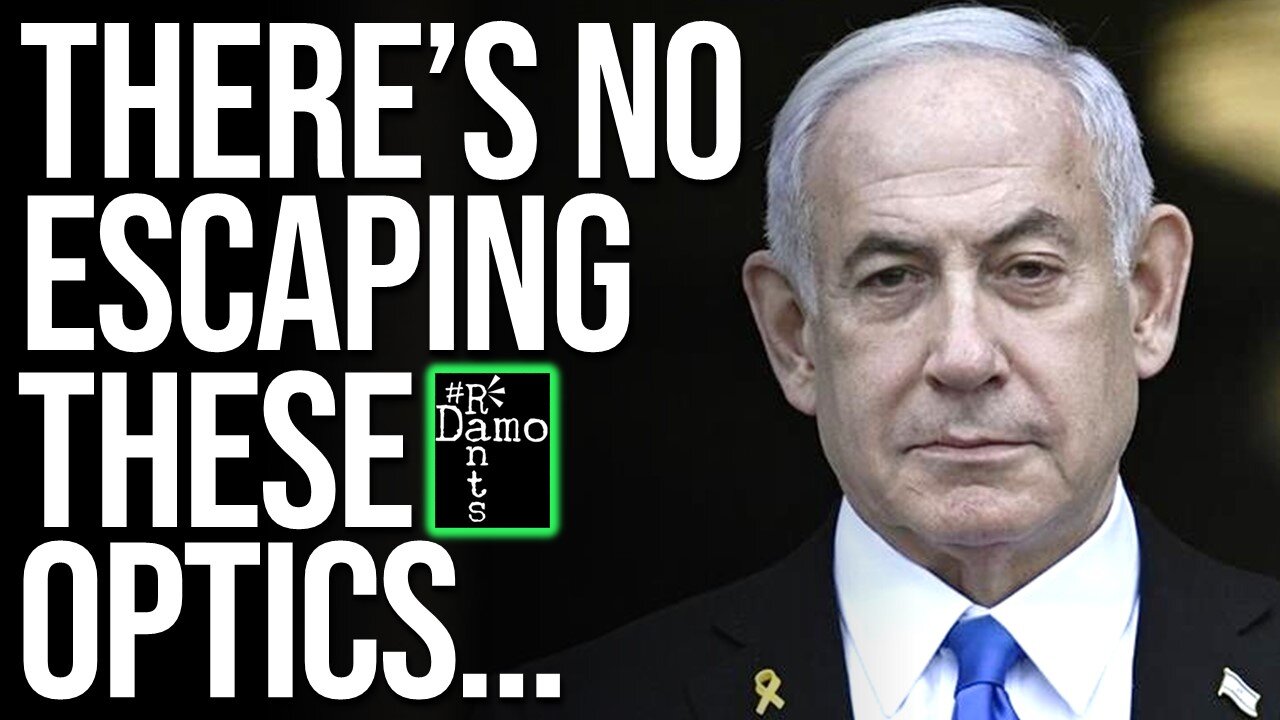Premium Only Content

Nazi Comparisons Go Mainstream In Israel—And It's All On Netanyahu
Right, so call it humanitarianism, Israeli-style: replace the UN with a militarised aid agency, shoot or gas civilians when they get too hungry, shove survivors into fenced “cities” that even ex-prime ministers call concentration camps, then politely ask the United States to help deport the rest. If Joseph Goebbels were alive, he might admire the branding—though even he didn’t dare call his ghettos “humanitarian.”
It shouldn’t need saying that you do not gas starving people queuing for food, but apparently it does need saying to Israel, who of course view them as something less than human. Earlier this week, twenty-one Palestinians died after riot-control gas was used at a food distribution site run by the Israeli-created Gaza Humanitarian Foundation (GHF). What should have been an act of life-saving aid became, instead, as we’ve become all too aware of at these GHF sites, it became a symbol of state-sanctioned cruelty.
For months, Israel had presented its operations in Gaza as reluctant necessities, justified by security concerns and framed as a moral obligation to protect civilians while combating Hamas. Yet its policies tell a far different but all too familiar story.
Right, so aid has been militarised through the GHF, not news to many of us, particularly if you are a regular viewer of this channel, widely accused of weaponising famine to control and weaken Gaza’s population. Meanwhile, Israel is forging ahead with plans for a vast fenced “humanitarian city” in Rafah that critics, including former Israeli prime ministers, have described bluntly as a concentration camp. Adding to this damning picture, Mossad chief David Barnea is actively lobbying the United States and other governments to accept Palestinian “refugees” from Gaza which is blatantly a euphemistic cover for mass population transfer.
Taken together, these developments form a coherent narrative of ethnic cleansing disguised as humanitarian concern. The global backlash has been severe, not least because the imagery and methods evoke the very atrocities Israel has long claimed to oppose. Nazi-era comparisons, once dismissed as antisemitic or hyperbolic, are now being made openly by Israeli leaders, humanitarian organisations, and Jewish activists. Where strong international leadership is required amid all of this though, it’s not going to come from the UK. Under the leadership of the overtly Zionist government of Keir Starmer has further tarnished its own credibility by prosecuting an Israeli anti-genocide activist for calling Israel “Nazi Israel,” even as Israel’s own political establishment is now using similar language.
The events of 16 July at Khan Younis have revealed in grotesque detail the cruelty embedded within Israel’s so-called humanitarian operations. According to Al Jazeera, the tragedy unfolded when GHF security forces deployed riot-control gas on a crowd of thousands of Palestinians waiting for food distribution. GHF later claimed only pepper spray and stun grenades were used, claimed people died from trampling, claimed there were armed Hamas elements present, but survivors described the acrid sting of tear gas, canisters rolling underfoot, and the overwhelming panic as people clawed for air and stampeded toward the exits. Twenty-one died from suffocation or trampling, and dozens more were injured.
The deaths were not an unfortunate accident. They were a predictable outcome of GHF’s militarised structure, which has now seen the first deaths recorded in Gaza due to people being suffocated with gas. Unlike UNRWA, which ran community-based distribution networks for decades without a single fatality, but which we’re supposed to believe were riddled with terrorists, the GHF is staffed by private security contractors operating under direct Israeli military oversight and they are death traps as a result. Entry into GHF sites is restricted and heavily monitored, the Hamas excuses just don’t wash. Civilians are funnelled through checkpoints, subjected to ID checks, and often turned away without explanation.
The choice of riot-control measures in a famine queue underscores this security-first mentality. To GHF, these civilians were not victims of starvation but potential security threats. Tear gas is not an accidental overreach; it is the logical consequence of viewing food lines as crowds to be controlled rather than people to be helped. Plan International as one humanitarian organisation amongst many, refused to cooperate with GHF, describing its operations as “not remotely humanitarian,” while other NGOs condemned it as a “population control mechanism masquerading as aid.”
The 16 July deaths are just the latest in the long line of atrocities taking place at these aid distribution sites. Just days later, Israeli forces fired on crowds approaching GHF food hubs, killing more than thirty people. Israel claimed soldiers fired only warning shots, but survivors contradicted this, saying the shooting was direct and indiscriminate. Together, these incidents confirm what Palestinians have argued for months: GHF is less a humanitarian operation than a tool of collective punishment, designed to starve Gaza’s population into submission.
The mental imagery of civilians gasping in clouds of smoke while clutching food rations is possibly the most damaging report in relation to GHF aid distribution yet, it has evoked powerful and obvious historical parallels. It reminded many of the deliberate use of starvation as a weapon in past atrocities, from Nazi Germany’s siege of the Warsaw Ghetto to the British Empire’s “protected villages” in the Boer War, where food was withheld to force compliance. Legal experts have pointed out that the use of starvation as a method of warfare is prohibited under Article 8 of the Rome Statute and constitutes a war crime under the Geneva Conventions. By militarising aid to such an extent that it kills those it is meant to save, Israel has effectively confirmed that humanitarianism is not the goal—control and depopulation are.
If GHF’s scandalous operations shattered Israel’s humanitarian narrative, the Rafah “humanitarian city” plan destroyed it outright. Announced as a solution for displaced civilians, the Rafah project involves the construction of a vast fenced camp under Israeli military control. According to Reuters and The Washington Post, leaked documents show that the facility will be heavily guarded, equipped with surveillance towers, and operate under strict movement restrictions.
Criticism has been fierce, even from within Israel and as that self proclaimed Jewish State, you might imagine it would be given the parallels. Former Prime Minister Ehud Olmert called the plan “a concentration camp for Palestinians” and warned it amounted to ethnic cleansing disguised as aid. Opposition leader Yair Lapid concurred, stating bluntly that if people are not free to leave, “it is a concentration camp.” These statements are extraordinary not only for their bluntness but because they come from mainstream Israeli politicians, shattering decades of political consensus that such comparisons were taboo.
The parallels to historical concentration camps are difficult to ignore. Like the ghettos of Nazi-occupied Europe, Rafah’s camp is designed to confine an entire population behind fences, under military guard, dependent on the very authority that displaced them for food and survival. Like the British Boer War camps, which were also justified as “humanitarian,” Rafah’s facility appears designed more to control and weaken than to protect. While Israel’s supporters may argue that Rafah is intended to save lives, the lack of planning for basic humanitarian needs and the broader context of forced displacement suggest otherwise.
The comparison to apartheid South Africa’s “resettlement camps” is also apt. These camps were designed to forcibly move Black South Africans from their land under the guise of providing safety. In Rafah, the same logic is at play: displacement under military control, justified as a humanitarian necessity.
International reaction has been severe. Haaretz published a searing editorial titled “Israel Wants to Build the Most Moral Concentration Camp in the World,” mocking the government’s claim to moral exceptionalism. Plan International and other NGOs have refused to participate, while EU foreign ministers from Germany, France, and Sweden have expressed alarm, warning that the plan violates international law.
The Rafah plan might still have been spun as misguided but well-intentioned were it not for revelations about Mossad’s involvement in population transfer. According to Press TV and Quds News, Mossad chief David Barnea has been personally lobbying the United States and other governments to accept Palestinians from Gaza as “relocated refugees.” Reports indicate that Barnea, with the help of US-Israeli businessman Steve Witkoff, held meetings in Washington to secure agreements for relocation to Egypt, Jordan, and even African countries.
The implications are explosive. Barnea’s involvement proves that population transfer is not a side-effect of war but a strategic objective orchestrated by Israel’s intelligence apparatus. It aligns perfectly with the broader strategy: make Gaza unliveable through famine, bombardment, and deadly aid hubs, then present relocation as the only option. Under international law, forced transfer of a population is a war crime under Article 49 of the Fourth Geneva Convention, and combined with deliberate starvation, it strengthens the genocide case now before the International Court of Justice.
Historical parallels again emerge. Nazi Germany described its forced deportations of Jews from ghettos to camps as “resettlement for security.” Israel now describes mass expulsion as “relocation for humanitarian reasons.” The language may have changed, but the logic is pretty similar, right?
For decades, Israel and its defenders have insisted that any comparison to Nazi policies is antisemitic. Yet what we’ve seen happen at Israeli hands in Gaza, what we’ve heard from Israeli figures of authority has marked a decisive shift. When individuals like Olmert and Lapid describe the Rafah plan as a concentration camp, when Haaretz openly mocks Israel’s moral posturing despite that, and when international humanitarian organisations reject Israeli policies as inherently inhumane, the taboo collapses.
The parallels are not superficial. Gaza is under a deliberate starvation siege reminiscent of the Warsaw Ghetto. The Rafah camp mirrors ghettoisation tactics, with no right to leave and military control. Israeli ministers have used dehumanising language, describing Palestinians as “human animals,” echoing Nazi propaganda that portrayed Jews as vermin or disease carriers.
Jewish activists are also speaking out. Holocaust survivor organisations and groups like Jewish Voice for Peace argue that Israel’s actions betray the principles that arose from the Holocaust.
The case of Yael Kahn here in the UK, is emblematic of this moral reckoning.
Yael Kahn is an Israeli-Jewish activist living in the UK, widely recognised for her outspoken anti-genocide advocacy and her vocal criticisms of Israel’s policies in Gaza. In January of this year, she was arrested after giving a speech outside the London residence of Israel’s far-right ambassador, Tzipi Hotovely, during which she used the term “Nazi Israel” to describe the killing of Palestinians—a reference grounded in the historical memory of her own family’s survival of the Holocaust.
Her description of Israel as “Nazi Israel” is not an isolated outburst but part of a growing movement within Jewish communities to confront Israel’s actions in moral terms. What they are doing here, they claim to be doing in Jewish interests after all, endangering Jewish lives due to the reality more and more people are waking up to.
The UK government’s response has been to criminalise this. Kahn, whose family survived the Holocaust, now faces formal charges at Highbury Magistrates’ Court for using that term, a term that former Israeli leaders themselves have used. The Islamic Human Rights Commission has accused the Metropolitan Police of racialising Palestine solidarity protests, applying one standard to pro-Israel demonstrators and another to Palestinians and their supporters. Coming off the back of the proscription of Palestine Action in the UK, a literal protest group now labelled as as big a terror threat to the UK as Al-Qaeda is, police crackdowns in light of just Palestine solidarity has now seen them threaten arrest, a clear abuse of the law itself.
The optics of Yael Khan’s prosecution are disastrous for the UK. At a time when global leaders are acknowledging the moral catastrophe unfolding in Gaza, Britain is prosecuting a Jewish anti-genocide activist, Israeli herself, for saying what the world can now see is true. This makes the UK appear not as a defender of free speech or human rights but as an enforcer of political censorship on behalf of a foreign state. A state where that Nazi boot is increasingly being seen to fit.
The cumulative impact of these events has been devastating for Israel’s standing as it should be, but they aren’t stopping.
Legally, the ICJ genocide case now has substantial evidence of intent. The ICC faces increasing pressure to indict Israeli leaders for war crimes. And in the Global South, countries are aligning against Israel, framing its actions as part of a broader Western double standard on human rights.
Netanyahu and his government wanted to quietly depopulate Gaza, starve it into submission, and present mass displacement as humanitarian policy. Instead, they have created a moral disaster. The world now sees gas being used on food lines, fenced camps described by Israeli leaders themselves as concentration camps, and secret lobbying to remove an entire population from its land.
If Israel feared being compared to Nazi Germany, it should have avoided acting like a state that starves, fences, and expels an unwanted population. These comparisons are no longer hyperbole—they are the language of international law, of former Israeli prime ministers, of Holocaust survivors, and of humanitarians who see history repeating itself. July 2025 will be remembered as the month Israel’s humanitarian mask slipped entirely, revealing the machinery of ethnic cleansing beneath it.
The question now is not whether history will judge. It is whether the world will act, or whether, like the democracies of the 1930s, it will keep standing by as history repeats itself.
Where governments are failing in the face of Israeli atrocity and genocide though, ordinary working class people are instead showing that we can all take a lead on this. Greek dockworkers have just refused to unload ships carrying military goods for Israel, driven through their trade union and the BDS movement in Greece and being so logistically valuable to Israel as Greece is this is a hefty blow and more could be coming. Check out that video recommendation here as your suggested next watch.
Please do also hit like, share and subscribe if you haven’t done so already so as to ensure you don’t miss out on all new daily content as well as spreading the word and helping to support the channel at the same time which is very much appreciated, holding power to account for ordinary working class people and I will hopefully catch you on the next vid. Cheers folks.
-
 LIVE
LIVE
vivafrei
3 hours agoDearborn Heights Police Have Been CONQUERED! Gender Madness on PASSPORTS! Canada Stuff & MORE!
10,669 watching -
 1:44:43
1:44:43
The Quartering
2 hours agoConservative Scam Busted, Black Fatigue Hits Airlines, Kimmel Meltdown
56K20 -
 LIVE
LIVE
Dr Disrespect
4 hours ago🔴LIVE - DR DISRESPECT - CRONOS: The New Dawn - FIRST IMPRESSIONS
2,072 watching -
 1:00:55
1:00:55
Mark Kaye
3 hours ago🔴 Trump Tells Tech Tycoons It's Time To Pay Up!
2.52K2 -
 LIVE
LIVE
Right Side Broadcasting Network
5 hours agoLIVE: President Trump Makes an Announcement - 9/5/25
2,592 watching -
 UPCOMING
UPCOMING
SportsPicks
2 hours agoCrick's Corner: Episode 77
23 -
 1:06:02
1:06:02
LindellTV
1 hour agoBREAKING: FBI Returns Mike Lindell’s Cellphone
3.37K6 -
 LIVE
LIVE
Jeff Ahern
57 minutes agoFriday Freak out with Jeff Ahern
122 watching -
 7:33
7:33
Talk Nerdy Sports - The Ultimate Sports Betting Podcast
4 hours agoFriday Night Lights in BRAZIL 🇧🇷🔥🏈
19 -
 LIVE
LIVE
Reidboyy
1 hour ago$20 Billion Dollar Warzone Tournament! Protect The President
90 watching